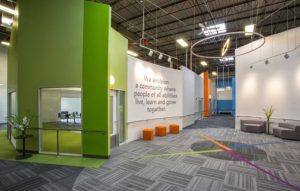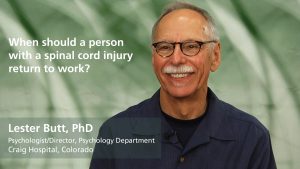This New Career Center’s Workplace Simulations Prepare People With Disabilities For Jobs
October 30, 2017
Aspire, a Chicago-based nonprofit that provides services for children and adults with developmental disabilities, was founded in 1960. When Jim Kales came on board as CEO around a decade ago, he found himself frustrated with the nonprofit’s job-training program. “It was very bespoke and one-at-a-time,” he tells Fast Company. “For example, Adrian, who has autism, would come in and say that he wants to work as a beekeeper. So we’d research beekeeping, and find someone in the profession and make an appointment with them, and begin a back and forth.” If Aspire kept at that system, Kales says, “we’d place five people in five years.”
 Kales “has always been fascinated with bringing business ideas into the nonprofit world”; he wanted to develop a new job-training system that would allow Aspire to place more people in roles, and also allow the nonprofit to solidify relationships with hiring companies in the Chicagoland area.
Kales “has always been fascinated with bringing business ideas into the nonprofit world”; he wanted to develop a new job-training system that would allow Aspire to place more people in roles, and also allow the nonprofit to solidify relationships with hiring companies in the Chicagoland area.
Aspire’s new Career Academy—a 10,000-square-foot facility 20 miles west of downtown in Oakbrook–will do just that. The Harry and Jeannette Weinberg Career Academy, which was named in honor of the donating foundation and officially opened October 19 as the first such facility in the country, provides comprehensive training and job-readiness prep for careers in six sectors: Warehousing and distribution, big-box retail, office and IT, culinary, hospitality, and fitness center administration.
At any given time, the Academy has the capacity to train around 100 people; previously, they could manage no more than 20. “It’s a market-based approach that gives us access to, essentially, 50% of the jobs in the Chicago area,” Kales says. While the old bespoke approach offered more latitude in terms of choice, the Academy, he adds, will deepen the quality of the training offered, and act as a trusted pipeline to local employers. “By limiting ourselves, we’re actually opening up all this ability to scale,” Kales says.
A New Approach To Job Training
By no means does the job training at the Career Academy consist of straightforward lectures. Inside the facility, the “classrooms” are set up to simulate the work environment of the six career tracks. The big box store section, for example, will have sample product to practice shelving, along with a register to manipulate. The warehousing and distribution track will have boxes to assemble and pack. Anyone interested in going through the Academy’s training course will first go through an assessment with Aspire to determine what track is right for them.
The process if deliberately flexible, Kales says; people can either train across all six sectors because they haven’t figured out which to specialize in, or they can decide to focus on just one. The Academy has been training around 50 people across all six sectors in the months leading up to the launch, and expect that they will soon scale up to the full 100, or maybe even 150.
The idea for the workplace-simulation training model came from a business acquaintance of Kales’s who was doing some consulting work for OfficeMax. Kales’s friend has a teenage son with autism, and while he was working with OfficeMax, he came up with the idea of the retailer developing a mock distribution center that would act as a training facility where his son could learn the ropes of a job there in a safe environment. In 2013, Aspire developed an official partnership with OfficeMax to train people with disabilities in the mock distribution center set up outside of Chicago. The partnership was successful enough that OfficeMax expanded it to three other cities, where they worked with various nonprofits that are partners of Aspire. Before the opening of the Career Academy, Aspire began training students in other areas like retail and hospitality.
“These are industries where they need tons of workers, and the work is repetitive,” Kales says. While it’s historically been tough for people with autism or other developmental disorders to find work, Aspire is aiming to prove that should not be the case. The OfficeMax partnership placed around 70 people with disabilities in jobs across the four cities, and the feedback from OfficeMax was that they became some of the most productive workers on staff.
“These are industries where they need tons of workers, and the work is repetitive,” Kales says. While it’s historically been tough for people with autism or other developmental disorders to find work, Aspire is aiming to prove that should not be the case. The OfficeMax partnership placed around 70 people with disabilities in jobs across the four cities, and the feedback from OfficeMax was that they became some of the most productive workers on staff.
Which is not to say there have not been hiccups, which the new Career Academy is working to address across the six sectors. Even though the work, in and of itself, is manageable, Kales says, difficulties tend to arise in loud or stressful situations, which can overwhelm people with disabilities. The curriculum at the Career Academy, which is spread out over roughly a year, consequently focuses 50% on “hard skills”–food safety rules, for instance, or distribution procedures–and 50% on “soft skills” like stress management. “Dealing with tense work situations, maybe even when people are yelling, is hard for anyone, but especially if you have autism,” Kales says. Workers and managers from the six sectors will come into the Academy and re-create various “almost battle conditions” to simulate some of the toughest days on the job to ready the students for the workplace.
It’s by no means easy, but Aspire’s new approach, to Kales, signifies the way in which the perception of people with disabilities, and their ability to participate in the economy, has evolved. Decades ago, “the idea in the field was that people with autism or other disabilities couldn’t work a real job,” Kales says. Instead, they would be given work in what were called “sheltered warehouses,” where 100 or so people would be lined up at tables, doing light assembly work like putting nuts and bolts together. The facility that now houses the Career Academy was once one such warehouse.
While the Career Academy is a pretty bold departure from the way Aspire and many other disability-focused nonprofits operate, Kales wants the new model become more like the norm–and to highlight the value of people who go through the program to the workforce and their communities. Because Aspire is Chicago-based, their aim is to partner with similar nonprofits in other cities–not unlike the approach they took with the original OfficeMax partnership–to encourage them to build out similar centers and training programs.
Kales is hopeful that the new center will inspire not only a shift in the way disability nonprofits operate, but in the wider business world. Separating people with disabilities from their communities and from the workforce–or only hiring people on a one-off or “charitable” basis–not only limits what they can do with their lives, but “communities and companies are missing out, too,” Kales says. “With the launch of the Academy, we’re on the verge of making a dent in this problem of symbolically hiring only one or two people, and really enabling many people to enter the workforce,” Kales says.

Leave a Reply